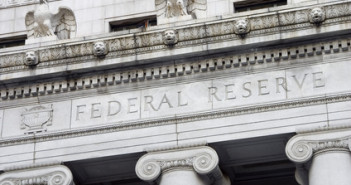Even if the government shutdown and the debt ceiling issues are resolved soon, the Fed is unlikely to taper bond buys in the remainder of 2013, as delayed and distorted data as well as ongoing political uncertainty still weigh, says Simon Smith of FxPro.
In the interview below, Smith also discusses downside risks in the dollar, future policy in Europe, and the chances of an accelerated monetary cycle for the UK.
Simon has over seventeen years experience of macro forecasting and investment strategy research. Prior to joining FxPro in May 2010, Simon was a consultant with Thomson Reuters, having spent four years as Chief Economist at Weavering Capital. He has held economic and strategy positions with Standard & Poor’s, together with consultancy firms 4Cast and MMS International. Simon holds an MSc. in Economics from the University of London and a BSc. from Brunel University.

After the US government shutdown, is QE tapering off the table for this year? Or is a “Dectaper” still on cards?I think tapering is now unlikely this year. Even if the shutdown and debt ceiling are both resolved in the next couple of weeks, the ramifications will be felt, with delayed and distorted data, so the Fed will find it more difficult than usual to know the current state of the economy. It’s always difficult to forecast what politicians are going to do but it’s currently a very poor backdrop. Even if there is a budget deal, it’s likely to be a continuation one that may just be a sticking plaster ahead a more comprehensive one. We have the debt ceiling to contend with and the impact of the sequester is starting to be more sharply felt across the economy.
What could happen to the US dollar in case of a technical default due to the debt ceiling? Would the greenback behave as a safe haven like in August 2011? Or will it be different this time?
I think we have reached a turning point on the dollar, not that it is going to totally fall out of bed, but we’ve definitely seen a change. In the run-up to the shut-down, the dollar under-performed all of the major currencies, this need to avoid the dollar greater than the ‘risk-off’ dynamic. Americans I speak to are relaxed, saying that this Is just the way they roll in the US and not to worry about it. But the US remains reliant on overseas money and this will increasingly be reluctant to move to the US the face of such events. So for the dollar, I see more downside risks now as compared to 2011.
BOE Governor Mark Carney was recently quoted saying he “does not see a case for new QE”. With the improvement in the economy, could he raise rates before 2016?The UK may appear to be doing OK, but the economy has still under-performed the US and has still yet to regain the pre-crisis level of output. From this angle, there is still some way to go, although note that the labour market performance is opposed to the US, i.e. unemployment did not fall as much. We should see a decent 3rd quarter, with growth of around 0.8%. I don’t think we will see rates higher by the end of 2014, but a tightening is a risk which I would put at around 20%. The tapering in the US will itself tighten financial conditions in the UK as market interest rates increase, something winch the UK central bank pushed against in July and August with its statements. I would struggle to see rates being held steady right through into 2016.
Assuming Merkel reaches an agreement on a grand coalition with the new SPD leadership, can Germany change its European policy? Could it allow more easing measures from the ECB?For Germany, it really depends how much ground Merkel has to give in any coalition negotiations. If anything, a move away from the austerity lead measures would make easing less likely as fiscal policy and lending conditions are more likely to be relaxed. But that would be a double-edged sword for the euro, as easing less likely but this is counter-balanced by higher long term rates in the periphery.
Japanese PM Abe announced a raise of the sales tax, but also talked about a new stimulus package. Do these policy changes balance each other or could the new stimulus weaken the yen?
The final details of Abe’s package are yet to be announced so it’s difficult to say. It’s the right thing to do because co gumption is taxes very lightly in Japan and this needs to be addressed. The issue is always whether lower corporate taxes spur greater investment and thereby increasing the overall tax take to the government. Combined with other structural reforms, this could still happen and there is evidence to suggest it can work, but ultimately it is a leap into the unknown. But that is what Japan has to do as it has stuck wig the status quo for far too long.
Further reading: How would a US debt default impact USD?
Get the 5 most predictable currency pairs

